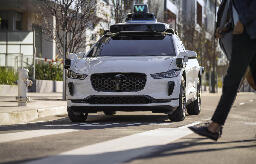Waymo issued a recall after two robotaxis crashed into the same pickup truck



Last year, two Waymo robotaxis in Phoenix "made contact" with the same pickup truck that was in the midst of being towed, which prompted the Alphabet subsidiary to issue a recall on its vehicles' software. A "recall" in this case meant rolling out a software update after investigating the issue and determining its root cause.
In a blog post, Waymo has revealed that on December 11, 2023, one of its robotaxis collided with a backwards-facing pickup truck being towed ahead of it. The company says the truck was being towed improperly and was angled across a center turn lane and a traffic lane. Apparently, the tow truck didn't pull over after the incident, and another Waymo vehicle came into contact with the pickup truck a few minutes later. Waymo didn't elaborate on what it meant by saying that its robotaxis "made contact" with the pickup truck, but it did say that the incidents resulted in no injuries and only minor vehicle damage. The self-driving vehicles involved in the collisions weren't carrying any passenger.
After an investigation, Waymo found that its software had incorrectly predicted the future movements of the pickup truck due to "persistent orientation mismatch" between the towed vehicle and the one towing it. The company developed and validated a fix for its software to prevent similar incidents in the future and started deploying the update to its fleet on December 20.
I'm getting tired of implementing technology before it's finished and all the bugs are worked out. Driverless cars are still not ready for prime time yet. The same thing is happening currently with AI or companies are utilizing it without having any idea what it can do.
That's is every single programme you've ever used.
Software will be built, sold, used, maintained and finally obsoleted and it will still not be 'complete'. It will have bugs, sometimes lots, sometimes huge, and those will not be fixed. Our biggest accomplishment as a society may be the case where we patched software on Mars or in the voyager probe still speeding away from earth.
Self-driving cars, though, don't need to have perfectly 'complete' software, though; they just need to work better than humans. That's already been accomplished, long ago.
And with each fix applied to every one of them, it's a situation they all shouldn't ever repeat. Can we say the same about humans? I can't even get my beautiful, stubborn wife to slow down, leave more space, and quit turning the steering wheel in that rope-climbing way like a farmer on a tractor does (because the airbag will take her hand off).
I'm against driverless cars, but I don't think this type of errors can be detected in a lab environment. It's just impossible to test with every single car model or real world situations that it will find in actual usage.
An optimal solution would be to have a backup driver with every car that keeps an eye on the road in case of software failure. But, of course, this isn't profitable, so they'd rather put lives at risk.
How will they encounter these edge cases without real world testing?
Fair point
I agree, but testing with a supervisory driver should be required in case of emergency situations. Both safer and creates job opportunities.
You're right there should be a minimum safety threshold before tech is deployed. Waymo has had pretty extensive testing (unlike say, Tesla). As I understand it their safety record is pretty good.
How many accidents have you had in your life? I've been responsible for a couple rear ends and I collided with a guard rail (no one ever injured). Ideally we want incidents per mile driven to be lower for these driverless cars than when people drive. Waymos have driven a lot of miles (and millions more in a virtual environment) and supposedly their number is better than human driving, but the question is if they've driven enough and in enough varied situations to really be an accurate stat.
A slightly tapped a car a first day driving, that’s it. No damage. Not exact a good question.
Look at how data is collected with self driving vehicles and tell me it’s truly safer.
My point asking about personal car incidents is that each of those, like your car tap, show we can make mistakes, and they didn't merit a news story. There is a level of error we accept right now, and it comes from humans instead of computers.
It's appropriate that there are stories about waymo, because it's new and needs to be scrutinized and proven. Still it would benefit us to read these stories with a critical mind, not to reflexively think "one accident, that means they're totally unsafe!" At the same time, not accepting at face value information from companies who have a vested interest in portraying the technology as safe.
I obviously do since I said look at how the data is collected, what is counted and what is not. Take your own advice and look into that. It’s not this one accident that makes me think it’s unsafe, and certainly not ready to be out there driving.
Here's an article saying that based on data so far, waymo is safer than human drivers. If you have other information on the subject I'd be interested to read it.
https://www.youtube.com/watch?v=pmGOjHi-7MM&t=129s This is a good and entertaining video on it but if you prefer to read here is the sources https://docs.google.com/document/d/1dWvHJLjikgWikFBf4wllk8etc-SIdC8maB0-7eZA7LM/edit
Also your own article "But it’s going to be another couple of years—if not longer—before we can be confident about whether Waymo vehicles are helping to reduce the risk of fatal crashes."
Here is an alternative Piped link(s):
https://www.piped.video/watch?v=pmGOjHi-7MM&t=129s
Piped is a privacy-respecting open-source alternative frontend to YouTube.
I'm open-source; check me out at GitHub.
That's how you get technological advancement.
Bureaucracy just leads to monopolies and little to any progress.